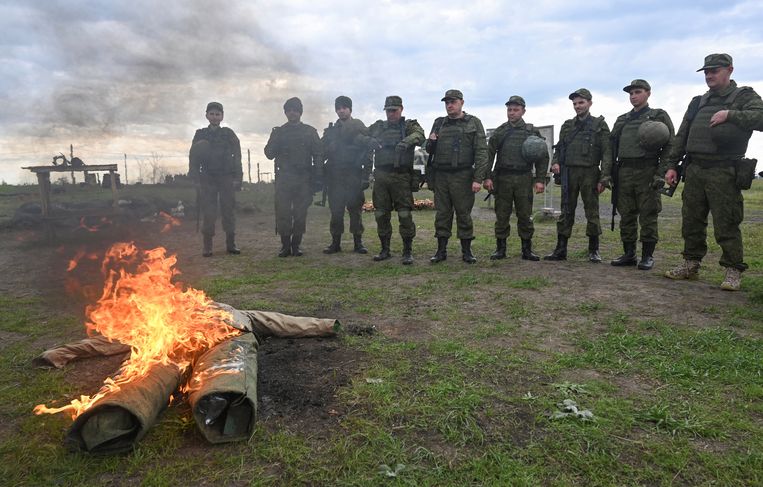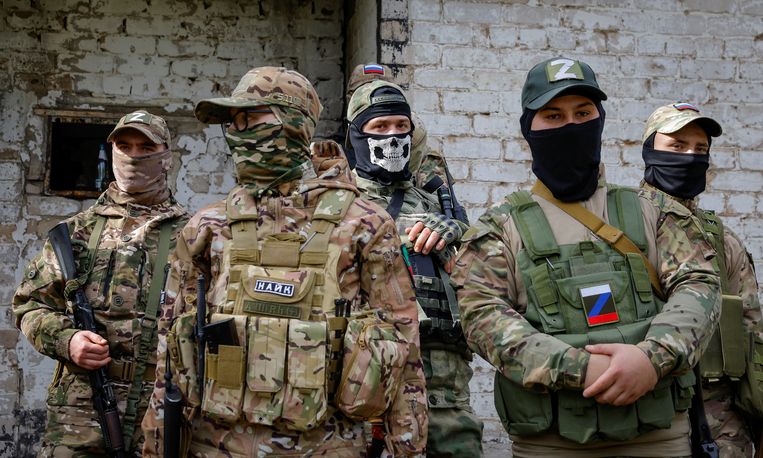The complaints of Russian soldiers have escalated since President Putin announced a “partial” mobilization late last month to compensate for the heavy losses in the war against Ukraine. In a video message last week, a group of soldiers from the Bashkortostan Autonomous Region complained that they had been sent to the front without training, food or medicine. Their officers asked hungry soldiers to repair a batch of trucks left by the Ukrainians so they could sell them for food.
Criticisms are heard even from the usually meek Russian parliament. How can the Russian army not provide its soldiers with necessary equipment despite significant defense spending? It is estimated that it constitutes nearly a quarter of the government’s budget.
Made of plastic
Every Russian knows the answer: corruption, combined with the Soviet tradition to make reality more beautiful than it is for your superiors. The latest weapons can be seen at the annual military parades on Red Square, but in practice, many of the Russian weapons on display are not yet available or have defects.
Ukrainians found Russian Orlan-10 drones assembled with plastic water bottles for fuel tanks and a regular Canon camera for video recording. Officially, these drones cost the Ministry of Defense almost one hundred thousand euros each.
In an investigation of a series of banks, the Central Bank of Russia concluded in 2016 that half of the funds allocated to orders from the ministry to the defense industry had disappeared without a trace through all kinds of mysterious construction.
paper soldiers
Robbery is everywhere in the army. Recruits talk about exercises with tanks and armored vehicles that are conducted only on paper. The soldiers were told that there was not enough fuel (probably because the leadership sold it). Last year, the commander of the military training district Kapustin Jar was arrested after selling several hundred tons of diesel.
Even in times of war, there is a lot of trade. During the war in Chechnya in the 1990s, Russian soldiers were seen pumping gasoline directly from their military trucks or armored vehicles into the cars of Chechen drivers. It is also common for barracks commanders to use conscripts as servants in the private sector to renovate their homes or to perform other odd jobs.
Another well-known trick used by corrupt officers is the representation of “dead souls”: soldiers who exist only on paper, but are in fact already retired. Or entire sets of clothes, shoes and shoes are written off, because they are supposedly no longer intact.
Inexplicable wealth
A BBC investigation into 558 corruption cases in the Russian military that have been brought to military courts over the past eight years has found that many officers have escaped their somewhat lenient sentences. Even if they pushed trucks full of military stuff.
The explanation is most likely that corruption is reaching the highest level. Everyone, from low to high, has an interest in turning a blind eye. After a conflict with the Kremlin, Russian Defense Minister Anatoly Serdyukov was forced to resign in 2013 due to a corruption scandal. But according to the Russian opposition, his successor, the current Defense Minister Sergei Shoigu, is completely corrupt. The anti-corruption organization FBK led by opposition leader Alexei Navalny revealed in 2015 that Shoigu, despite his modest state salary, lives in a huge villa in Barvisha, a village of the Russian elite near Moscow.
It is also said that the newly appointed commander of Russian forces in Ukraine, General Sergei Surovkin fjorstka It owns some capital buildings registered in the Land Registry as property of the “Russian Federation”. This is the construction that the rulers of President Putin’s regime often use to hide their inexplicable fortunes.

Buy conscription
Putin’s recent mobilization has given a new impetus to a classic type of corruption, according to Ilya Shumanov, head of the Russian branch of Transparency International. It has been customary for decades among wealthy parents to buy their sons military service with bribes. But now that reservists are suddenly called up to the war in Ukraine, the market has exploded. Exemption prices can rise to more than 1 million rubles (converted to more than 16 thousand euros).
On their way to border posts with countries like Georgia, Russians trying to evade mobilization face all kinds of “charges” from corrupt agents of the Russian traffic police. Often they are waiting for a final hitch at the border, which is a financial contribution to the right border guards.







